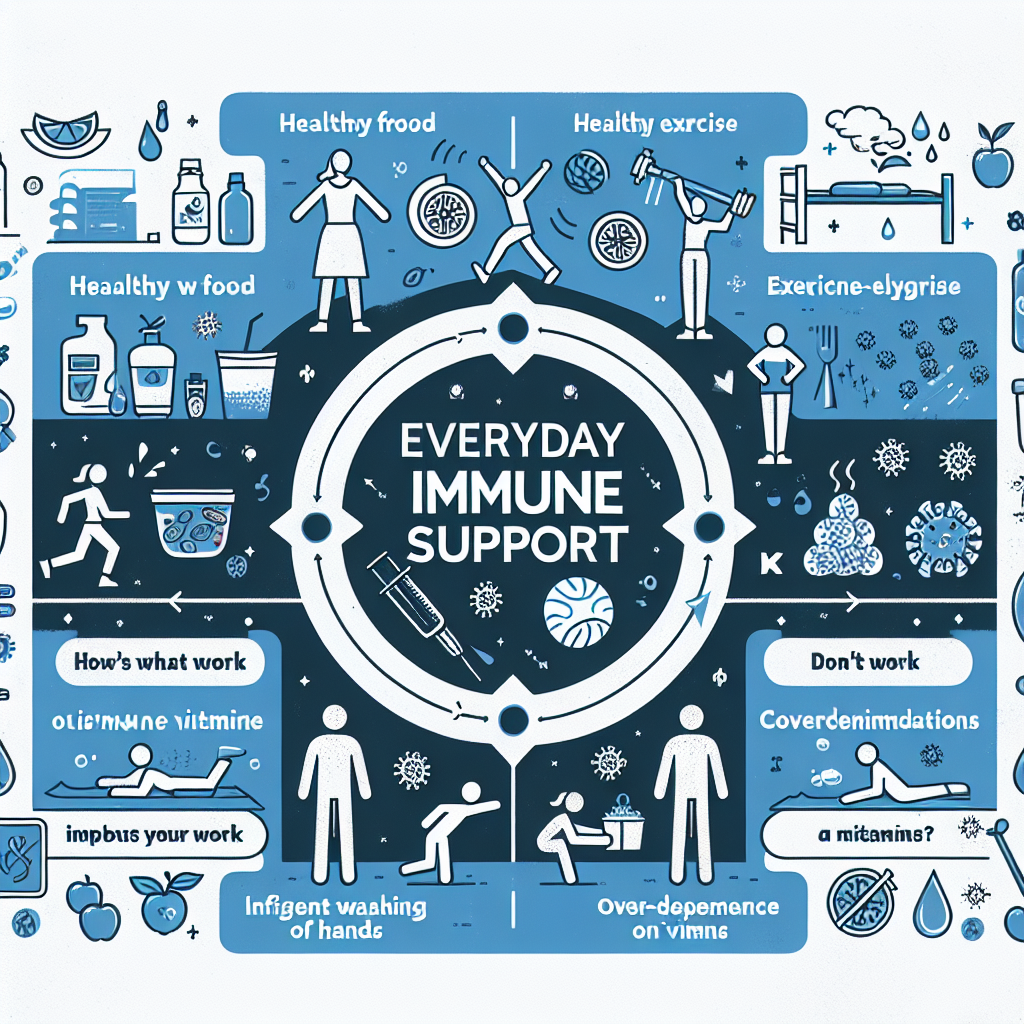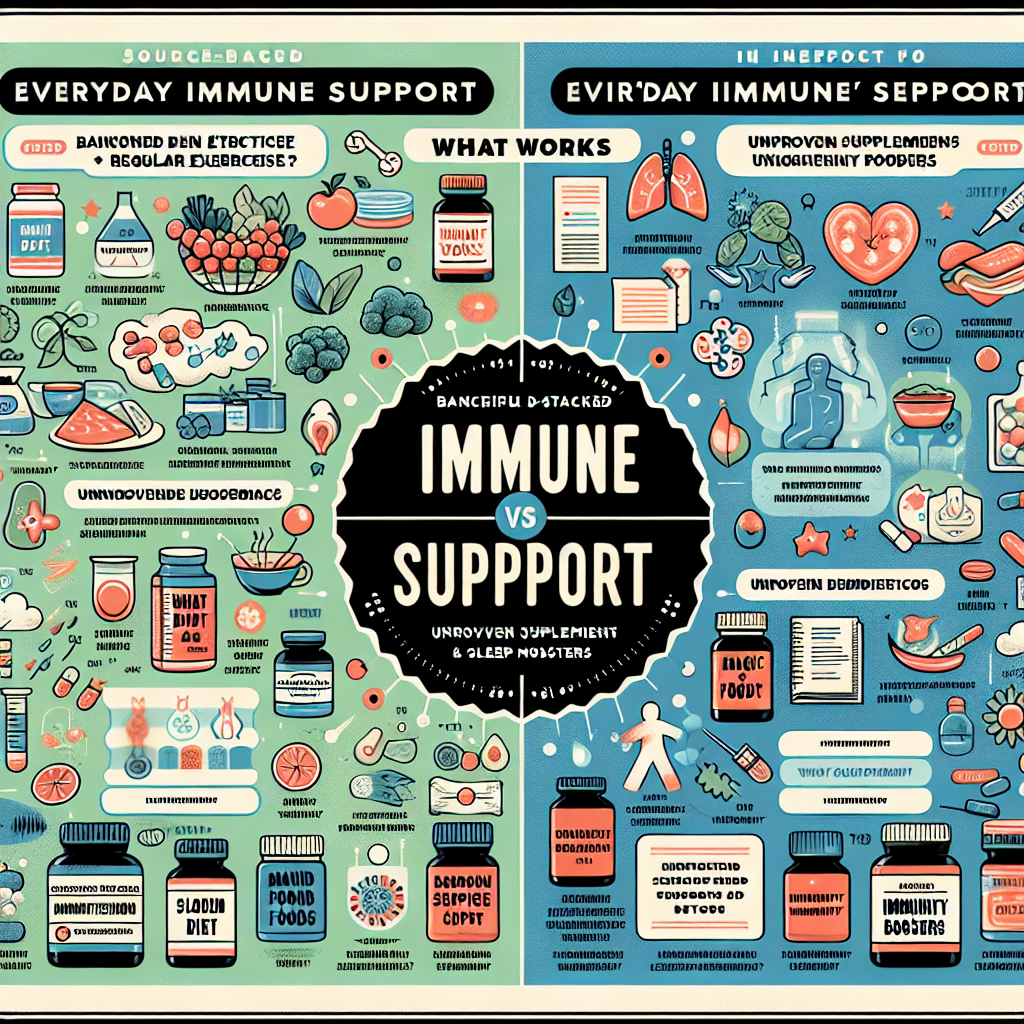Everyday Immune Support: What Works and What Doesn’t

Discover what works and what doesn’t for everyday immune support. Learn more about effective strategies and debunk common myths. Boost your health today by visiting myvibrantvitality.com.
Exploring the Efficacy of Common Immune Support Methods: What Works and What Doesn’t
In the quest for optimal health, the immune system plays a pivotal role. It is our body’s primary defense mechanism against disease-causing microorganisms. As such, it is crucial to maintain a robust immune system. However, the question remains: how can we effectively support our immune system? In this article, we will explore the efficacy of common immune support methods, discerning what works and what doesn’t.
Firstly, let’s consider the role of diet. A balanced diet rich in fruits, vegetables, lean proteins, and whole grains is often touted as a means to bolster the immune system. This is because these foods are packed with essential nutrients that our immune system needs to function optimally. Vitamins A, C, and E, as well as minerals like zinc and selenium, are particularly beneficial. Research has shown that deficiencies in these nutrients can lead to a weakened immune response. Therefore, it is safe to say that a nutrient-rich diet is indeed effective in supporting the immune system.
Next, we turn our attention to the use of supplements. Many people turn to supplements as a convenient way to get their daily dose of immune-boosting nutrients. However, the efficacy of supplements is a topic of ongoing debate. While some studies suggest that supplements can help fill nutritional gaps, others argue that they are no substitute for a healthy diet. Moreover, excessive intake of certain supplements can lead to toxicity and other health problems. Therefore, while supplements can play a role in immune support, they should be used judiciously and under the guidance of a healthcare professional.
Exercise is another method commonly recommended for immune support. Regular physical activity is known to improve cardiovascular health, lower blood pressure, and promote good circulation, all of which can enhance the immune response. Moreover, exercise can help reduce stress and improve sleep, both of which are beneficial for immune function. Therefore, it is clear that regular exercise is an effective way to support the immune system.
Lastly, let’s consider the role of sleep. Sleep is a time when our bodies repair and regenerate, and this includes our immune system. Studies have shown that lack of sleep can impair the immune response, making us more susceptible to infections. Therefore, getting adequate sleep is crucial for immune support.
However, it’s important to note that while these methods can support immune function, they are not foolproof shields against disease. Even with a healthy diet, regular exercise, adequate sleep, and appropriate use of supplements, it is still possible to fall ill. This is because the immune system is influenced by a multitude of factors, including age, genetics, and exposure to pathogens. Therefore, while these methods can enhance immune function, they should be complemented with other preventive measures such as regular handwashing, avoiding close contact with sick individuals, and getting vaccinated.
In conclusion, a balanced diet, regular exercise, adequate sleep, and judicious use of supplements can all contribute to a robust immune system. However, these methods should be part of a comprehensive approach to health that includes other preventive measures. As always, it is best to consult with a healthcare professional for personalized advice on immune support.
Decoding Everyday Immune Support: Effective Strategies and Misconceptions

Everyday immune support is a topic that has gained significant attention, especially in the wake of the global health crisis. As we navigate through the maze of information available, it is crucial to distinguish between effective strategies and misconceptions.
Firstly, let’s delve into the concept of immune support. The immune system is a complex network of cells, tissues, and organs that work together to defend the body against harmful invaders. It is not a single entity but a system that requires balance and harmony to function optimally. Therefore, the idea of boosting your immunity overnight is a misconception. Instead, the focus should be on maintaining a healthy lifestyle that supports the immune system’s natural functioning.
One of the most effective strategies for everyday immune support is maintaining a balanced diet. Nutrient-rich foods provide the vitamins and minerals necessary for the immune system to function effectively. For instance, citrus fruits, bell peppers, and strawberries are high in vitamin C, which is known to enhance immune function. Similarly, foods rich in zinc, such as lean meats, poultry, and seafood, can help the immune system fight off invading bacteria and viruses.
Another effective strategy is regular exercise. Physical activity can boost your immune system by promoting good circulation, which allows the cells and substances of the immune system to move through the body freely and do their job efficiently. However, it’s important to remember that moderation is key. Overdoing it can lead to an opposite effect, causing stress on the body and weakening the immune system.
Adequate sleep is another crucial factor in supporting immune health. During sleep, the immune system releases proteins called cytokines, some of which help promote sleep and fight off infection or inflammation. Lack of sleep may decrease the production of these protective cytokines and other immune cells, making you more susceptible to illnesses.
While these strategies are effective, there are also several misconceptions about immune support that need to be addressed. For instance, the idea that taking high doses of vitamin C can prevent colds is a common myth. While vitamin C is essential for immune health, taking it in excess does not necessarily prevent illness and can lead to side effects like nausea and diarrhea.
Another misconception is that ‘natural’ immune-boosting supplements can replace a healthy lifestyle. While certain supplements can support immune health, they should not be used as a substitute for a balanced diet, regular exercise, and adequate sleep. It’s also important to consult with a healthcare professional before starting any new supplement regimen, as some can interact with medications or have side effects.
Lastly, the notion that you can ‘boost’ your immune system to maximum capacity is misleading. The immune system is precisely that – a system, not a single entity that can be ramped up at will. It requires balance and harmony to function optimally. Overstimulation of the immune system can lead to autoimmune diseases and allergies.
In conclusion, everyday immune support involves a holistic approach that includes a balanced diet, regular exercise, and adequate sleep. While certain supplements can support immune health, they should not replace a healthy lifestyle. It’s also important to be aware of common misconceptions about immune support and to consult with a healthcare professional before starting any new regimen. By understanding what works and what doesn’t, we can make informed decisions to support our immune health effectively.
The Truth about Everyday Immune Support: Proven Techniques versus Myths
The human immune system is a complex network of cells, tissues, and organs that work together to defend the body against harmful invaders. It is our first line of defense against disease and infection, and maintaining its optimal function is crucial for overall health. However, there is a lot of misinformation circulating about what can and cannot boost our immune system. This article aims to separate fact from fiction, providing a clear understanding of proven techniques for everyday immune support versus common myths.
Firstly, let’s address the elephant in the room: the idea that a single food or supplement can ‘boost’ your immune system is largely a myth. The immune system is not a single entity that can be instantly enhanced by a magic pill or superfood. Instead, it’s a complex system that requires balance and harmony to function effectively. Therefore, the best approach to support your immune system is to maintain a healthy lifestyle overall. This includes a balanced diet rich in fruits, vegetables, lean proteins, and whole grains, regular physical activity, adequate sleep, and stress management.
One of the most scientifically proven ways to support your immune system is through regular exercise. Physical activity can help flush bacteria out of the lungs and airways, reducing your chance of getting a cold, flu, or other illness. Exercise also causes changes in antibodies and white blood cells, which are the body’s immune system cells that fight disease. These antibodies or white blood cells circulate more rapidly, so they could detect illnesses earlier than they might have before.
Another proven technique is getting enough sleep. Sleep deprivation can negatively affect the immune system, making you more susceptible to infections. During sleep, your immune system releases proteins called cytokines, some of which help promote sleep. Certain cytokines need to increase when you have an infection or inflammation, or when you’re under stress. Sleep deprivation may decrease the production of these protective cytokines.
On the other hand, the idea that loading up on vitamin C can prevent or cure a cold is a common myth. While vitamin C is essential for immune function, taking large doses won’t necessarily prevent you from getting sick. It may reduce the duration and severity of a cold, but it won’t stop it from happening.
Similarly, the belief that ‘starving a fever’ can help your body fight off illness is also a myth. When you’re sick, your body needs more energy to function, so depriving it of food can actually weaken your immune system and slow down your recovery.
Lastly, the notion that being cold or wet can make you sick is another myth. While these conditions can make you uncomfortable, they don’t cause you to get sick. The common cold is caused by viruses, not cold or damp conditions. However, it’s worth noting that extreme cold can weaken your immune system, making you more susceptible to these viruses.
In conclusion, the best way to support your immune system is through a balanced lifestyle that includes regular exercise, adequate sleep, and a healthy diet. While certain vitamins and supplements can aid in maintaining a healthy immune system, they should not be relied upon as a sole means of immune support. It’s also important to dispel common myths about immune health to ensure that we’re taking the right steps to protect and support our bodies.